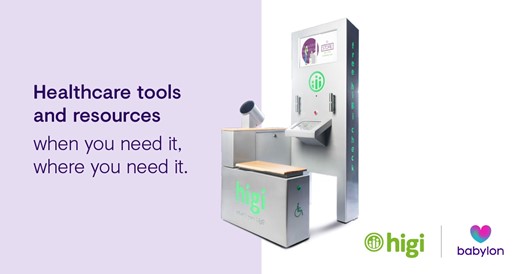Perspectives
7wireVentures Presents: Top of the Ladder Featuring Higi CEO, Jeff Bennett and Babylon Founder and CEO, Ali Parsa
Recently, 7wireVentures had the pleasure of sitting down with Jeff Bennett, CEO of 7wireVentures portfolio company Higi, and Ali Parsa, Founder and CEO of Babylon. Continue reading to learn about the backgrounds of these two highly skilled healthcare entrepreneurs and why they are each excited about the new partnership to drive always on, accessible, consumer-centric care.
Jeff – What did you want to be when you grew up?
 Well, my first passion was baseball, but I quickly realized that I was not going to be a professional baseball player, or even less than that. Interestingly, my cousin actually ended up being a major league baseball player, so I jokingly say I helped him get there by giving him all the self-confidence.
Well, my first passion was baseball, but I quickly realized that I was not going to be a professional baseball player, or even less than that. Interestingly, my cousin actually ended up being a major league baseball player, so I jokingly say I helped him get there by giving him all the self-confidence.
Ali – Your early life’s journey is quite a formative one, initially being born in Iran, traveling through Afghanistan and Europe, and ultimately, settling as a refugee in London. How do you believe these experiences have shaped your life outlook and leadership style today?

Ali: The truth is that I was incredibly privileged to be born in a middle-class family to wonderful parents with incredible values. I am a huge believer that 90% of your luck in life comes the day you are born. You mentioned I immigrated through Afghanistan; imagine if I was born in a village in Afghanistan, with no running water, electricity, or access to education. When you are born, it is like the beginning of a race. For many of us, from the start, you are nine tenths of the way to the finish line. Life, in my view, is all about how far you go, not about where you end up. In that context, yes, I was a refugee, but I was a refugee from a middle-class family. While I had to do a lot of it all on my own, I always had the moral support of my family and my friends behind me.
“I am a huge believer that 90% of your luck in life comes the day you are born” – Ali Parsa, Founder and CEO of Babylon
Jeff & Ali – What was your first job?
Jeff: I cut a lot of lawns. In the beginning, my mother was my sales assistant. She was an entrepreneur, making women’s clothing and wedding dresses. She probably made over 100 wedding dresses throughout her lifetime and because of that, we always had people coming to our house. I would use that opportunity to cross-sell her customers on my lawn services. We covered three different towns and became a full household service – cutting grass and making clothes.
Ali: When I was a kid, as you can imagine, I had all sorts of ideas in my head. As a teenager, I had a real determination to be a political activist. I thought that was going to be my mission in life to instill social justice and to fight for social equality. I thought I would be a leader of a political party and do that all my life. Of course, as you mature, you understand there are many ways to make a real difference.
Jeff & Ali – We are thrilled about the recent investment in and partnership between Babylon and Higi. Can you share what excites you most about the partnership opportunity across these two companies?

Jeff: At Higi, we are focused on meeting consumers where they are and educating them on important topics like heart health, diabetes, and brain health. We identify high risk consumers, whether that’s around hypertension, obesity, risk of diabetes, risk of stroke, or risk of heart attack. The investment and partnership with Babylon fuels our newfound ability to build a fully connected solution that not only navigates consumers to care, but ultimately become a full service, digital first primary care solution.
Personally, I have cardiovascular disease; I was fortunate enough to prevent the one health issue my father gave to me. I found out that I had this disease by taking preventative measures, rather than learning from symptomatic issues. I would much rather use Higi every day, or use a connected device at home, get my lab from the pharmacy, and then talk to my doctor over the phone if I need to, versus going into the office for an appointment. That is the world that we believe we can create with Babylon. This partnership will give us the ability to design and develop what we think is the optimal flow for patients as they navigate through their health journey.
Ali: Babylon is all about how you can create models of keeping people healthy by realigning the incentives around health as opposed to getting paid to fix people who are sick. Higi solves one of the main fundamental ecosystem issues. Everything that takes place in a hospital will eventually end up taking place at home. Anything that helps that journey is important. Higi can support to communities where previously they could only access tests in hospitals and in clinics. We also know that innovation will continue to evolve. Today, the Higi machine provides blood pressure readings. When the phone can do so, there will be new devices to incorporate into the Higi station. Imagine a day where an X-ray, an MRI, and a CT scan can be self-administered through a Higi station in your community store! By doing so, Higi propels the mission of making healthcare available to as many people as possible in the communities they live in. This goal feeds into both of our organizations’ mission of making healthcare accessible and affordable and putting the right tools into the hands of every human.
Ali – You have now founded and led two healthcare companies, Circle Health and Babylon. Can you share why you have dedicated the past 15+ years of your career to healthcare?
 Ali: It was entirely accidental. I was a banker at Goldman Sachs and my first child was just born. I took two weeks of paternity leave. After, I returned, and I quit because I fundamentally decided I wanted to be an entrepreneur again. While I had time off, I had two surgeries for several pent-up sports injuries. I saw how much could be done to improve hospitals and thought to myself, “Surely we can do better than this!” So then, I went to start the chain of private hospitals. This became Circle Health; they did very well, and that experience was very satisfying. During that time however, I learned that the vast majority of people’s healthcare has very little to do with hospitals. Today, healthcare is waiting for somebody to get sick. If instead you focus on trying to keep people healthy and help them to avoid emergencies, you will have a much better outcome and much lower costs. Healthcare is one of those amazing industries where better results are cheaper, and that is not true in most other industries.
Ali: It was entirely accidental. I was a banker at Goldman Sachs and my first child was just born. I took two weeks of paternity leave. After, I returned, and I quit because I fundamentally decided I wanted to be an entrepreneur again. While I had time off, I had two surgeries for several pent-up sports injuries. I saw how much could be done to improve hospitals and thought to myself, “Surely we can do better than this!” So then, I went to start the chain of private hospitals. This became Circle Health; they did very well, and that experience was very satisfying. During that time however, I learned that the vast majority of people’s healthcare has very little to do with hospitals. Today, healthcare is waiting for somebody to get sick. If instead you focus on trying to keep people healthy and help them to avoid emergencies, you will have a much better outcome and much lower costs. Healthcare is one of those amazing industries where better results are cheaper, and that is not true in most other industries.
“Healthcare is one of those amazing industries where better results are cheaper, and that is not true in most other industries.”– Ali Parsa, Founder and CEO, Babylon
Jeff & Ali – Can you share some of the greatest challenges you have faced in scaling a successful venture-backed company? What do you believe has contributed to Higi/Babylon’s success thus far?
Jeff: I have been an entrepreneur in multiple industries. When creating a new company, you have to realize that you must move at the pace that the industry is going. Even if you have a vision of how fast you think transformation or change should occur, often these shifts are not completely within your control. The challenge is to make sure that you drive on a path that allows you to continue to operate even if you could go faster. There is a saying that if you want to run fast, run alone. If you want to run far, run together. The major component of scaling a new business is knowing the dynamics of who is ready to work with you and make sure you focus on those organizations, and understand who is not and realize that you may not change them.
From a success standpoint, I think it is a combination of factors. First, when you are trying to transform an industry, it takes money to do so. You want to be sure you have investors that believe in what you are doing. You want to choose a problem that is actually significant and meaningful enough that the investors continue to support you through tough times. The second is putting the right team in place. That team can change over time. The third is picking who you partner with; often that relates to customers as they are going to define your success. If you work with the wrong customers, they can burn your resources out.
“There is a saying that ‘If you want to run fast, run alone. If you want to run far, run together.’. The major component of scaling a new business is knowing the dynamics of who is ready to work with you and make sure you focus on those organizations”– Jeff Bennett, CEO Higi
Ali: Starting a company is frankly very easy. It is like anything else, you put a methodology in place and get the job done. It is a process of bringing the right resources, talents, people, and the science together to make it happen. The challenge is how you go about growing that company. This starts from the moment you have an idea and when you must ask yourself: how do I want to finance this idea? That simple decision has profound effects on your ability to do one thing or another. The way we finance our startups today, entrepreneurs have 18 months to develop a product and another 18 months to generate revenue. This dynamic determines the kind of problems a company can address: problems that can be demonstrated to be solved in a year or two-year period. So, what do you do? Many companies focus on just one siloed area in order to achieve the results and prove key milestones to raise the next round of funding.
I have been incredibly lucky at both of my companies (Babylon and at Circle), to solve the finance problem. For the first three to four years at Babylon we didn’t have any revenue, but we just focused on solving the bigger problem. Once we did that, we were able to accelerate revenue growth, and continuously do so year on year because we had built a solid foundation. We could do that because we looked at the whole problem rather than a slice of the issue. Long term foundational thinking is really important in making sure you succeed.
Jeff & Ali – What is your superpower?
 Jeff: My superpower is probably my passion for the problem. I truly have an unending passion to address healthcare access and prevention. I grew up in a household where my dad had his first heart attack when I was eleven years old, and my uncle died nine days later after a massive heart attack. My passion for the problem, because of what I lived through, is something that fuels me because I know we need to expand access and education and bring this to the rest of the world, particularly to underserved populations.
Jeff: My superpower is probably my passion for the problem. I truly have an unending passion to address healthcare access and prevention. I grew up in a household where my dad had his first heart attack when I was eleven years old, and my uncle died nine days later after a massive heart attack. My passion for the problem, because of what I lived through, is something that fuels me because I know we need to expand access and education and bring this to the rest of the world, particularly to underserved populations.
Ali: If I had to pick, it would be that I am a long-term thinker. When I was a child, I read a biography of Einstein, and I was fascinated by his visualization techniques. I’m very good at thinking very hard and deeply for a very long time about the vision of the future. That makes it easy for me to see if something does or does not fit in to the broader strategy. When talking about Higi for example, the decision for me to invest was only a 20-minute decision because I could immediately see where it could fit into that long-term vision we had.
Jeff & Ali – What book are you reading right now?

Jeff: I’ve been reading The Death Gap by David Ansell. I have been wanting to read it but now especially as we’re paying increased attention to health inequities, this book fits into everything that we’re doing.

Ali: I’m currently reading What is Life? By Jay Phelan. The book is about understanding biology. I’m reading this because I genuinely think that synthetic biology will have a similar impact to what technology did to our society over the last couple of decades. Imagine what we could, and what we will, do when we can start manipulating biology at a genetic level. The challenges from this will be astounding. The book does a great job talking about exactly how humans could be and what responsibilities come with this.
Jeff & Ali – And lastly, what is one piece of advice that you would give to our readers?
Jeff: From an entrepreneurship perspective, you have to have absolute passion for what you do. If you don’t have absolute passion, I don’t think you’re going to make it through this process. It is important to take a gut check; your passion can change over time. If you find that your passion is gone, then it might mean that it’s time to do the next thing.
“Have an absolute passion for what you do”– Jeff Bennett, CEO Higi
Ali: Find the most difficult of problems and solve it. I am always amazed by how many people find the simple problem. I think easy problems are the worst problems; I also think impossible problems are equally the worst problem to solve; those are for dreamers. We have so many big problems to solve that it is a waste of time to focus on the little ones. Entrepreneurs of course, need to balance those hard problems with challenges of trying to finance that within the financial realities.
“Find the most difficult of problem and solve it” – Ali Parsa, Founder and CEO, Babylon